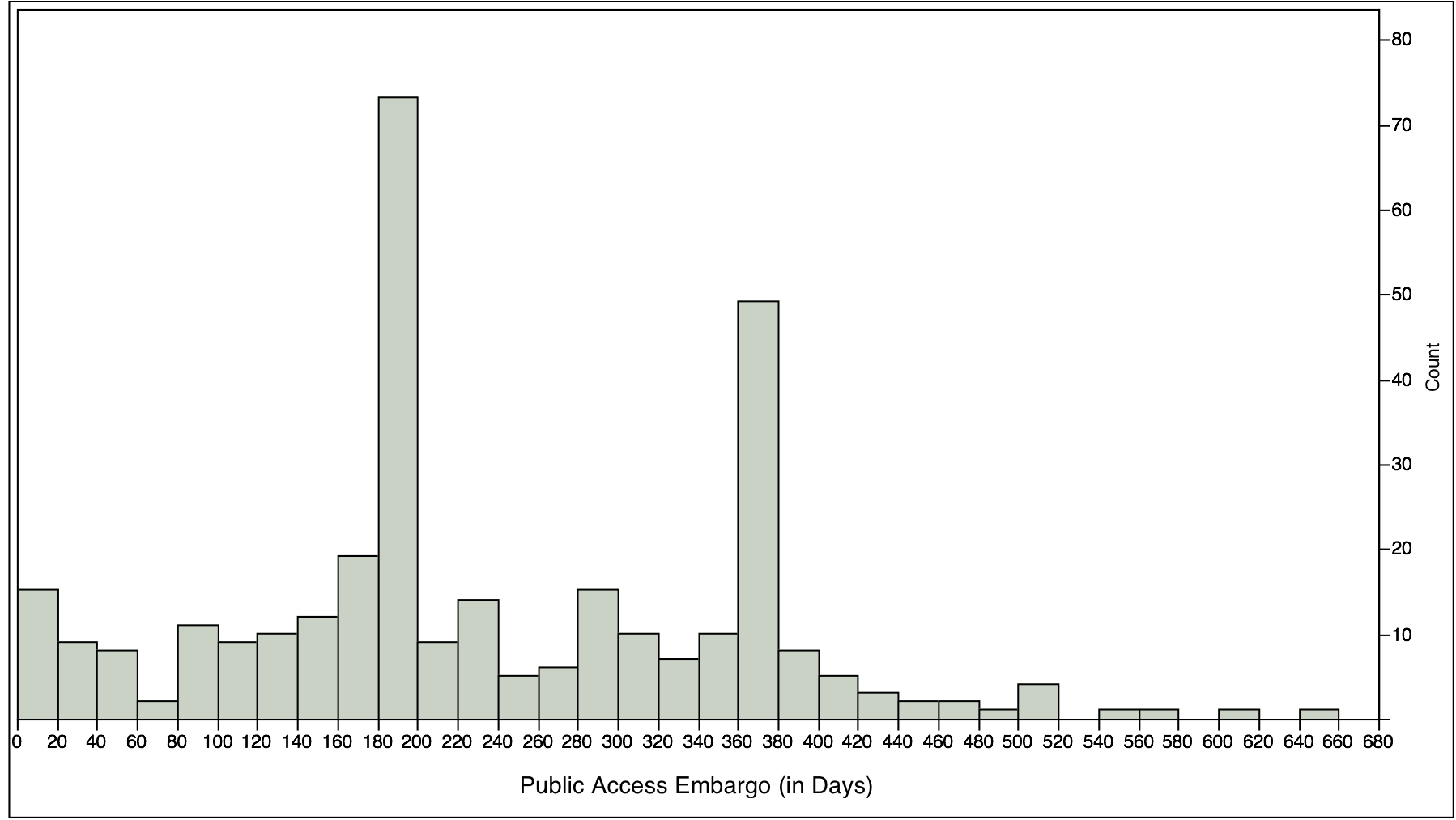When it comes to self-archiving of final author manuscripts, many authors either do not understand or blatantly disregard government and publisher policy.
According to the NIH Public Access Policy, authors must deposit a copy of their final accepted manuscript into PubMed Central no later than 12-months after publication of their article. Some journals, like Science, permit a much shorter embargo period of just six months.
Comparing the public access dates of 322 final manuscripts deposited in PMC and published in Science between January 2010 and March 2012 reveals some interesting details. While 18% (59) of authors selected 180 days (Science‘s embargo policy), 30% (95) selected a shorter span of time; of this set, 3% (10 authors) selected an embargo date of less than one week after publication.
The majority of authors (52% or 168) occupied the other end of the spectrum, selecting an embargo period of more than 180 days, with 14% (45) of authors choosing the NIH policy embargo policy of 360 days, and 10% (33) of authors depositing in arrears — making their manuscript publicly available more than a year after their article was formally published. It is not known from the data how many authors disregarded the NIH policy and did not submit their manuscript to PMC.
To me, these results suggest that many authors are poor custodians of their final manuscripts when it comes to following publisher and funder policies. Either authors do not understand them or simply disregard the details.
Second, it also suggests that if these embargo periods are important to funders and publishers, both could do more to enforce them. For example:
- Publishers could archive manuscripts on behalf of their authors. Many publishers already do this as a service to authors, which ensures that all manuscripts declaring NIH-funding are properly deposited as mandated by law.
- PubMed Central could store a simple file with journal embargo periods and calculate the public access date automatically. This would resolve the ambiguity in embargo dates.
Either solution would do much to ensure that authors fulfill their commitment to their funders, publishers, and to the general public.
Discussion
9 Thoughts on "Policy, Shmolicy: Many Authors Disregard Self-Archiving Embargoes"
The Wellcome Trust, a large UK charitable scientific funding body has been experiencing the same problem. After rolling out an open access policy in 2006 that states their researchers must deposit articles in PubMed Central within 6 months of publication, only 55% of papers generated from research that it funds comply with this. In response they recently announced that they will be penalising researchers who don’t follow the policy. From the beginning of 2013:
-
Final grant payments will be withheld from researchers who do not publish research funded by the Wellcome Trust open access
Non-OA research articles published after 2009 will not count towards grant applications
Researchers will have to agree to publish all Wellcome Trust funded publications OA before funding renewal or new grants are awarded.
We’ll have to wait and see how effective these measures are.
Enforcement is expensive. The folks who write rules often ignore this, thinking that words are their product. Nor does it surprise me that academics are not great followers of capricious rules. Good for them.
Defying “capricious rules” is all well and good, unless you’ve taken the rule-makers’ money and agreed to abide by them. By taking the NIH’s money, you’re agreeing to abide by the terms of the grant, capricious or not. To take the money and then rebel against the rules after spending it doesn’t strike me as particularly praiseworthy.
From the publisher perspective, (1) is easy enough to do but (2) sounds impractical technically (“automatically” 😉 ) if you take into account the number of dates a journal publishes online in addition to the less frequent print issues (mulitplied by the number of journals covered by the repository concerned).
I don’t see solution #2 being that difficult. The default solution would have the user type in the publication date of the article (A) and PubMed Central simply calculates that the day of public access be A+360 days. A lookup table would permit shorter embargo times, such as Science (6mo.) or, for some, no embargo period at all. The fact that the system allows submitting authors to specify no embargo period at all (in violation of the publisher policy) or <360 days (in violation of government policy) is a major shortcoming of their system and should be fixed.
The PEER project (Publishing and the Ecology of European Research, http://www.peerproject.eu/about/ ) included a behavioural research study with the goal “to develop an understanding of the perceptions, motivations and behaviours of authors and readers with respect to the use of authors’ final draft manuscript in Open Access Repositories”. There’s quite a lot of information in the final report on why authors do/do not self-archive.
Report can be found via the ‘06 Sept 2011 – D4.2 PEER Behavioural Research – Final Report’ link at http://www.peerproject.eu/reports/ and the pdf at http://www.peerproject.eu/fileadmin/media/reports/PEER_D4_final_report_29SEPT11.pdf .




